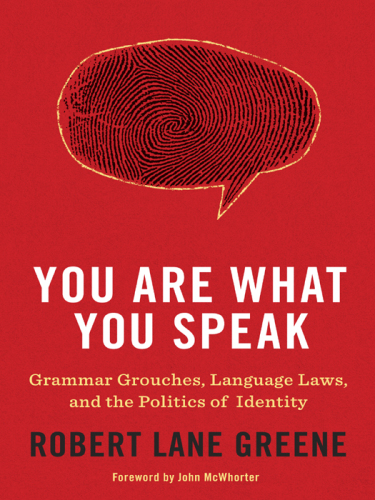
You Are What You Speak
Grammar Grouches, Language Laws, and the Politics of Identity
کتاب های مرتبط
- اطلاعات
- نقد و بررسی
- دیدگاه کاربران
نقد و بررسی

January 17, 2011
A correspondent for the Economist and a self-professed lover of language, Greene takes on language "mythologizers" of all forms, like bestselling author Lynne Truss and other language "sticklers" for whom the superiority of "their" language also represents the superiority of "their" people. Greene asserts that language is about communication rather than just rules and that debates about language and its rules are often really about politics. Defending Black English as a dialect with strict rules of its own, Greene also relates how the imposition of Afrikaans, the symbol of South African apartheid, on the black majority sparked the violent riots that marked the beginning of the end of apartheid, and how the father of modern Turkey criminalized the writing of Turkish in Arabic script. In the end, he argues, simplicity in a language doesn't denote its "decline"; rather, languages become simpler and more flexible in order to spread and succeed. Though Greene argues perceptively and passionately, his controversial arguments still won't, for the most part, persuade traditionalists who bemoan the deterioration of English.

January 1, 2011
A wide-ranging study of language, including the various political dimensions involved in how and why certain languages gain prestige while others become extinct.
How have industrialization and nationalism shaped language variation worldwide? Is the writing system a natural outgrowth of speech, or can it simply be changed by government edict? Is there really one correct way of speaking English? Is the French language being threatened? Are Chinese characters really based on pictographs? These are just a handful of the many intriguing questions, issues and "linguistic myths" that Economist contributor Greene investigates in this fascinating glimpse at the global politics of language variation. Essentially, the book is a course in sociolinguistics and modern international language politics for the layperson. The author, who speaks nine languages, begins by dispelling a variety of language myths that are pervasive and, to the chagrin of many linguists, seemingly unshakeable—that some languages are more primitive than others, that the Qur'an cannot be translated from Arabic, or that the Maori of New Zealand have 35 words for dung. Greene also exposes grammar sticklers—people who are obsessively determined to "purify" language and who are nostalgic for a linguistic utopia that never existed—for the persnickety and curmudgeonly group they really are. The author blends personal narrative, reportage and humor with linguistic analysis, historical research and political punditry, and he surveys some of the most significant issues concerning language today, including the ethnocentrism involved in some English-only activism in America, as well as the draconian—and largely unsuccessful—measures of the French Academy to keep French free of English words. Greene correctly demonstrates that language change, language variety and cross-language borrowing are "highly regular" and, in fact, part of the natural evolution of all languages.
An insightful, accessible examination of the way in which day-to-day speech is tangled in a complicated web of history, politics, race, economics and power.
(COPYRIGHT (2011) KIRKUS REVIEWS/NIELSEN BUSINESS MEDIA, INC. ALL RIGHTS RESERVED.)

February 1, 2011
In the parade of books offering guidance on writing, journalist Greene (international correspondent, the Economist) marches against the traffic. He tackles touchy questions, ultimately asking "Who has the most power to shape language, namely the linguist, politician, celebrity, teacher or parent?" Drawing on his own training in politics, sociology, and nine languages, Greene presents abundant examples of "language police" efforts, consistently demonstrating political and economic motivations. He packages all of this into eight chapters of accessible prose, complete with notes sections. For example, he examines U.S. immigrant assimilation experiences, including Spanish-language retention among Latino immigrants. The 20th-century renewal and revisions of the Turkish, Hebrew, Greek, and Irish languages are also highlighted. Greene boldly considers the cost to individuals unable to communicate with grandparents versus the benefits of being able to communicate in a complex, global economy. VERDICT This is a detailed read, recommended for serious language students, both matriculated and otherwise, who may also enjoy Guy Deutscher's cultural study, Through the Language Glass: Why the World Looks Different in Other Languages.--Marianne Orme, Des Plaines P.L., IL
Copyright 2011 Library Journal, LLC Used with permission.

























دیدگاه کاربران